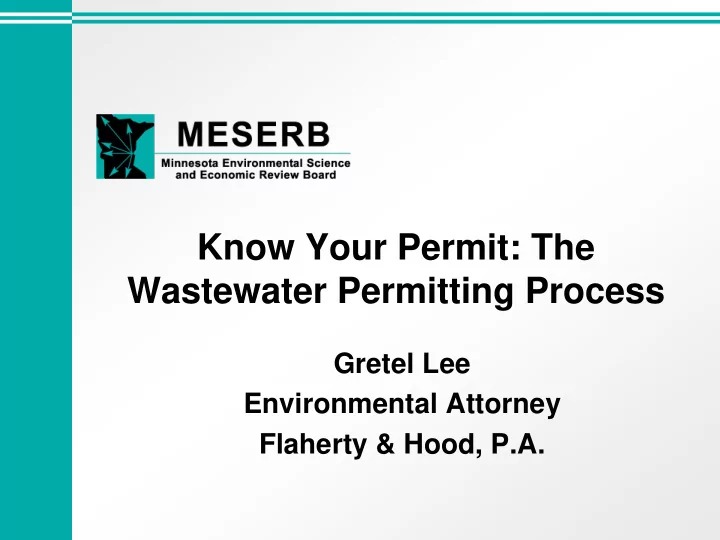

Know Your Permit: The Wastewater Permitting Process Gretel Lee Environmental Attorney Flaherty & Hood, P.A.
Key Takeaways • Be proactive during effluent limit notification process—respond to “ASAP letter ” in an informed manner • Review and comment on the pre-public notice draft permit • If MPCA does not resolve serious and legitimate concerns, preserve your rights in the public notice and comment period • Early engagement = better outcomes for less cost/headache
Summary of the Permitting Process • Five-year permit cycle • Effluent limit notification process - “ASAP” Letter • Advanced review of draft permit and fact sheet • Notice and public comment period (60 days)
What are Effluent Limits? • Effluent limits are based on water quality standards – Standard = Rule or regulation being applied – Effluent Limit = Application of that standard in your permit • Under law, MPCA has to set effluent limits to comply with water quality standard (WQS) – When you submit permit reapplication, MPCA is required to perform a “ reasonable potential” analysis to assess compliance with WQS – New limits required if discharge has the “ reasonable potential ” (RP) to cause or contribute to a violation of WQS.
Permit Marriage • Once a limit is in your permit, you are “married” to it • Very difficult to remove a limit once it is in your permit (anti-backsliding) • Limits can have lasting impacts on growth, development and infrastructure needs
Mistakes Happen! • Technical errors in permits can cost millions of dollars • Acceptance of questionable terms can lead to burdensome conditions and unreasonable results • Fixing problems after the fact can be expensive and difficult
Keys to Successful Permit Process • Be proactive engage with MPCA to raise questions and concerns early in the effluent limit notification process (“ASAP letter”) • Be informed —request supporting documentation/analysis, verify information given to you and answer key questions • Evaluate alternatives that make environmental improvements, are cost-effective and comply with law
Keys to Successful Permit Process • Pick your battles— pursue legitimate concerns—supported by sound technical and legal analysis • If MPCA does not address your significant and legitimate concerns, preserve your rights in public comment process Participate in public comment process Request a formal informational meeting Petition for contested case hearing
The “ASAP” Letter • The “ASAP” letter will identify new permit limits • Information requested from MPCA: Evaluation of facility ability to comply Steps/Action that need to be taken to achieve compliance ASAP Proposed compliance schedule Pursuit of variance or other compliance alternatives • Answer the following questions before you respond:
High-Level Questions to Answer: Are the permit conditions accurate and justified? What is the benefit to water quality? Does my facility need upgrades to comply? What is the cost of compliance—impact on rate- payers? Is compliance feasible? If so, how and when? Are there other alternatives (i.e. plant optimization, offsets, variances etc.)? Availability and probability of obtain funds (i.e. PSIG and WIF)
Responding to the ASAP Letter • Content of your response is critical • Request additional time to respond if needed • Request supporting information and analysis from MPCA • Identify technical, environmental, and legal questions and concerns • Provide informed answers to MPCA’s Qs
Responding to the ASAP Letter • Evaluate compliance alternatives • Request and establish basis for extended compliance schedule, if justified – Current debt on infrastructure – Economic impact on residents, business, and future growth – Other environmental priorities – Time needed to perform upgrades, if necessary
Pre-Public Comment Process • MPCA provides 30 day pre-public comment draft permit • Review draft permit and provide comments • Has MPCA addressed the concerns identified in the effluent limit notification process? • Are there any minor issues that need to be fixed?
60-Day Public Comment Period Any member of the public (including you) can: Submit comments Request Public information meeting Petition for contested case hearing
60-Day Public Comment Period If MPCA has not addressed significant and supportable concerns you may preserve your rights by: Filing comments Requesting contested case/public meeting
Final Permit • If no contested petition is filed, MPCA will respond to comments (if any) and issue final permit • Right to appeal w/n 30 days to MN Court of Appeals
Individual Proactive Approach Summary • Five-year permit cycle • Effluent limit notification process - “ASAP” Letter – Answer necessary questions before response • Advanced review of draft permit and fact sheet • Notice and public comment period (60 days) – Participate – If necessary, preserve your permit rights! • Final permit – other options
Questions? Gretel Lee Daniel Marx Environmental Attorney Environmental Attorney Flaherty & Hood, P.A. Flaherty & Hood, P.A. gllee@flaherty-hood.com dmmarx@flaherty-hood.com (651) 259-1903 (651) 259-1907 www.meserb.org
Recommend
More recommend